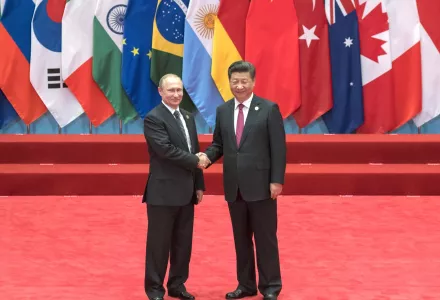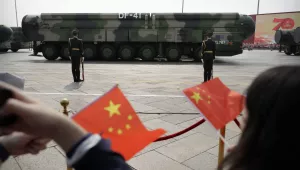
Abstract
Although Russia can no longer exercise hegemonic power or demand exclusive rights of engagement, it is still the preponderant regional player in Central Asia.
Conventional wisdom holds that China and Russia have managed to reach a tacit understanding over their respective roles in Central Asia. Some argue that, with Beijing effectively conceding to Russia the leading role in an emerging security architecture, the threat of a renewed Great Game in the region has been deferred. Others concur that, to many observers’ surprise, Central Asia's independent states have not become objects of rivalry between Moscow and Beijing, but rather a major unifying element in SinoRussian relations. The two governments, they underscore, cooperate more closely in Central Asia than in any other world region. A third group suggests that based on the evidence available thus far, Russia and China have upended predictions of greater competition and succeeded in transforming a potential source of tension into a means of greater cooperation and mutual reassurance. More recently, thanks to Russia's involvement in the Syrian and Ukrainian conflicts, and internal economic woes caused by the imposition of Western sanctions and the decline in the price of oil, many leading observers believe Russia is neglecting its ‘soft underbelly’ – Central Asia – and losing ground in the region.
In fact, there is neither a strong Sino-Russian confrontation nor a clear ‘division of labour’ in Central Asia. In both security and cultural diplomacy, Russian President Vladimir Putin has presided over a more proactive, assertive and, ultimately, effective policy in Central Asia. Although this policy is still constrained significantly by Russia's limited financial and economic means, Moscow has strengthened its influence, for the most part thanks to amiable relations with the Central Asian strongmen who still almost completely dominate politics in their respective countries.
Given the current power transition under way between Russia and China, a significant question is whether Beijing has challenged, or is likely to challenge, Moscow's preponderance in Central Asia. In the short run this is unlikely. It is all too easy to lapse into clichés about the inevitable decline of Russia, the inexorable rise of China and the global retreat of the West as a public-goods provider. Whereas China tends to avoid direct involvement in local politics, Russia's preponderant strategic and cultural involvement in Central Asia has a direct bearing on the political stability of the local regimes. The Central Asian domestic political environment is affected by the larger context of Russian politics and foreign policy. In fact, as the scholars Rajan Menon and Hendrik Spruyt have observed, the domestic stability of Central Asian states is affected by a combination of the type of nationalism that prevails in political culture, the robustness of local political institutions – and the effects of economic reform in Russia itself. Kazakh President Nursultan Nazarbayev, for example, has been careful to make sure that Kazakhstan's economic reforms proceed in step with Russia's, often sending to his legislature for minor modification bills previously passed by the Russian parliament. Although Russia is no longer in a position to exercise hegemonic power or demand exclusive rights of engagement, it is still the preponderant regional player in Central Asia, and will remain so for the foreseeable future. Russia remains the most important external actor, exercising leadership in the management of regional security and skillful influence over Central Asian political elites.
Skalamera, Morena. “Russia’s Lasting Influence in Central Asia.” Survival, November 19, 2017




